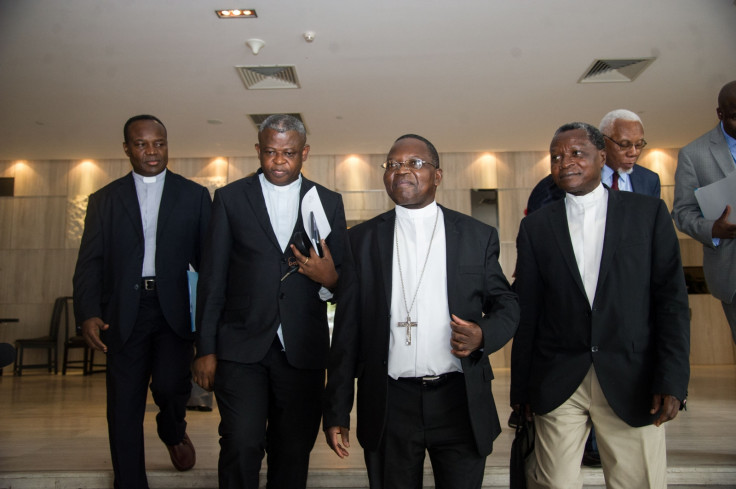DRC's powerful Catholic church sides with Congolese people who want political change
IBTimes UK exclusively speaks to the Church's commission hoping to prevent much feared bloodshed.

With less than a week to go before President Joseph Kabila's second term ends, the Catholic Church is hoping to broker an agreement between the Democratic Republic of Congo (DRC)'s political actors in a bid to avoid bloodshed.
President Kabila has been in power since 2001 and served two full terms, as permitted by the Congolese constitution. Kabila is due to stand down on 19 December, but he has been accused of manoeuvring to ensure he can remain in power indefinitely.
Commentators believe the president may have reservations about stepping down because of fears he may face charges for alleged crimes and may be distressed about his personal security or his wealth being cut off.
As the fateful date looms, the future of the largest country in Africa is being played on the second floor of a small building in the capital Kinshasa's city centre at the Diocesan Centre of DRC's powerful Catholic church, the National Episcopal Conference of Congo (Cenco).
IBTimes UK exclusively spoke to Père Clément Makiobo Malelo, executive secretary of the DRC Episcopal Justice and Peace Commission, as he waited to enter the national dialogue room at Cenco's offices.
"The church's mission is to work towards the emergence of the rule of law, and for peace. Every time the country has faced issues, the church did not withdraw within itself but instead committed to help the DRC to recover and arise," Makiobo Malelo said. "In the eyes of many Congolese, it is absolutely normal that the church would take this initiative to reach out to political actors and invite them to be responsible in the face of the great dangers facing the DRC."
'The Congolese people is waiting for change'
Highlighting how Cenco's stance is "biased" towards the side of the Congolese people, the clergyman said: "The aspirations of the people is where our interests lay."
The Catholic mission has not hidden its inclination towards ensuring upcoming elections are not delayed, and has been outspoken on the subject of Kabila's future.
Makiolo Malelo added: "When we look back to the recent events that have unfolded here in the DRC, we can see that the people is expecting a great deal from a political alternance [changeover], they want transparent, democratic and appeased elections. The Congolese people is waiting for change, and improvements in its welfare especially with regards to its social needs, access to drinking water, electricity, healthcare, education – these are all things the Congolese people is waiting for. But in order to achieve this, they believe the elections – even if they don't solve everything – can be a gateway to a responsible and democratic governance."
Cenco has been mediating talks between Kabila's political alliance, the presidential majority (MP) and the Rassemblement, a broad coalition of opposition groups. The mediation is seen as the last chance to prevent the DRC from erupting into violence on 19 December, when some in Congo have pledged to remove Kabila from office. It suspended its involvement after a brutal crackdown on 19 September protests which left more than 50 dead. If Cenco also refused to sign the 18 October political agreement – boycotted by the Rassemblement – it agreed to find a way to reconcile all different political parties.
Commentators have admitted reservations about the success of this potential eleventh minute accord, but Makiobo Malelo said the Catholic Church's role relative to the state could ensure unrest is prevented.
"To understand the role of the Cenco and the church's implication in the political life would be difficult in a country such as the United Kingdom. In DRC, however, since Independence, it is the Church which has organised most structures, including education, and who has helped educate the Congolese elite who is today in power," the clergyman explained.
"Cenco has a code of conduct: first, as actors of Cenco and the Catholic Church, we don't get involved in politics and so we have no interest at stake other than the nation's interest. We are not candidate for a position, and this gives us much more freedom."
© Copyright IBTimes 2025. All rights reserved.






















